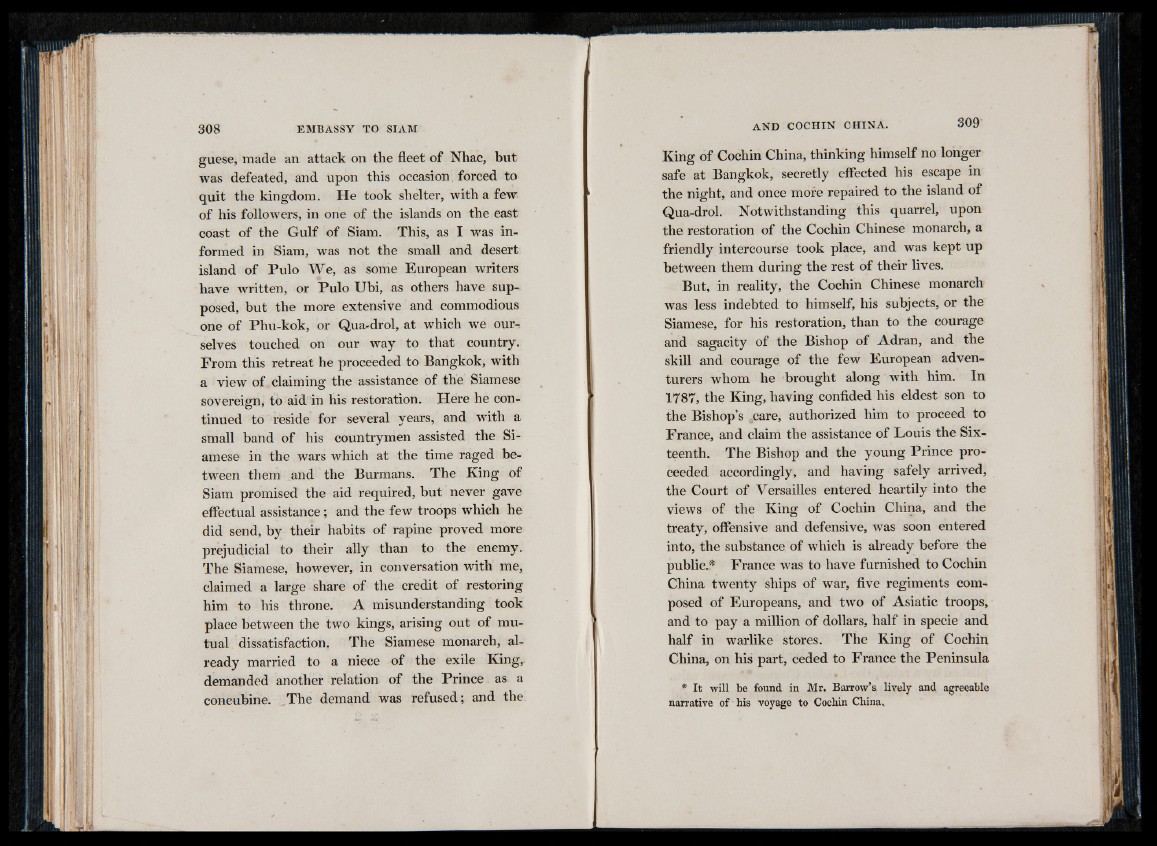
guese, made an attack on the fleet of Nhac, but
was defeated, and upon this occasion forced to
quit the kingdom. He took shelter, with a few
of his followers, in one of the islands on the east
coast of the Gulf of Siam. This, as I was informed
in Siam, was not the small and desert
island of Pulo We, as some European writers
have written, or Pulo Ubi, as others have supposed,
but the more extensive and commodious
one of Phu-kok, or Qua-drol, at which we ourselves
touched on our way to that country.
From this retreat he proceeded to Bangkok, with
a view of claiming the assistance of the Siamese
sovereign, to aid in his restoration. Here he continued
to reside for several years, and with a
small band of his countrymen assisted the Siamese
in the wars which at the time raged between
them and the Burmans. The King of
Siam promised the aid required, but never gave
effectual assistance; and the few troops which he
did send, by their habits of rapine proved more
prejudicial to their ally than to the enemy.
The Siamese, however, in conversation with me,
claimed a large share of the credit of restoring
him to his throne. A misunderstanding took
place between the two kings, arising out of mutual
dissatisfaction. The Siamese monarch, already
married to a niece of the exile King,,
demanded another relation of the Prince as a
concubine. .The demand was refused; and the
King of Cochin China, thinking himself no longer
safe at Bangkok, secretly effected his escape in
the night, and once more repaired to the island of
Qua-drol. Notwithstanding this quarrel, upon
the restoration of the Cochin Chinese monarch, a
friendly intercourse took place, and was kept up
between them during the rest of their lives.
But, in reality, the Cochin Chinese monarch
was less indebted to himself, his subjects, or the
Siamese, for his restoration, than to the courage
and sagacity of the Bishop of Adran, and the
skill and courage of the few European adventurers
whom he brought along with him. In
1787, the King, having confided his eldest son to
the Bishop’s ecare, authorized him to proceed to
France, and claim the assistance of Louis the Sixteenth.
The Bishop and the young Prince proceeded
accordingly, and having safely arrived,
the Court of Versailles entered heartily into the
views of the King of Cochin China, and the
treaty, offensive and defensive, was soon entered
into, the substance of which is already before the
public.* France was to have furnished to Cochin
China twenty ships of war, five regiments composed
of Europeans, and two of Asiatic troops,
and to pay a million of dollars, half in specie and
half in warlike stores. The King of Cochin
China, on his part, ceded to France the Peninsula
* It will be found in Mr. Barrow’s lively and agreeable
narrative of his voyage to Cochin China.